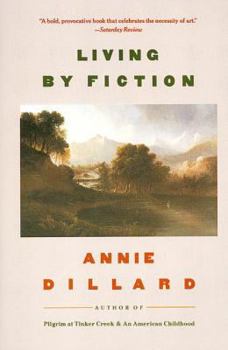Living by Fiction
Select Format
Select Condition 
Book Overview
"Everyone who timidly, bombastically, reverently, scholastically--even fraudulently--essays to 'live the life of the mind' should read this book. It's elegant and classy, like caviar and champagne, and like these two items, it's over much too soon." --Los Angeles Times Pulitzer Prize-winning author Annie Dillard's classic work of literary criticism Living by Fiction...
Format:Paperback
Language:English
ISBN:0060915447
ISBN13:9780060915445
Release Date:January 2000
Publisher:Harper Perennial
Length:192 Pages
Weight:0.85 lbs.
Dimensions:0.5" x 5.3" x 8.0"
Customer Reviews
4 ratings
Truly Magical
Published by Thriftbooks.com User , 16 years ago
Amazing, magical! Annie Dillard's command of our shared language is truly amazing and her vision distinctive. From her sensitivity to the vagaries of the human condition to her exploration of Christian and Jewish mysticism, this is a wonderful book - one which can be dipped into again and again.
The meaning of a whale
Published by Thriftbooks.com User , 16 years ago
A friend to whom I once commended this small volume replied, "Dillard. TINKER CREEK. Nope. She takes forever to get to the point." Maybe so. But as Greyhound used to brag, "Getting there is half the fun." And simply getting there is the intriguing subject of my favorite Dillard essay published in TEACHING A STONE TO TALK (Harper & Row, 1982). LIVING BY FICTION is aimed first at readers and writers of fiction, but more broadly at artists and art audiences, and finally (if anyone remains excluded) at those who wonder if the world has meaning and if such meaning might be discerned. Like any hiking trail worth the walk, Dillard's path will lead you through unexpected swamps and over mythic mountains. You will visit Bucky Fuller's epistemology and Kubla Khan's dome (which, come to think of it, is an invertible tour through Bucky's domes and Khan's epistemology). What does a whale mean? Does an unpublished, unread novel in an attic trunk contribute to the structure of the universe? This book may anger, intrigue, puzzle or delight. It will not disappoint.
Art Is Interpretation
Published by Thriftbooks.com User , 18 years ago
"Living By Fiction" is in essence a treatise by Annie Dillard that attempts to interpret art, and thereby includes fiction as art, and as an interpretation. The book is well constructed and the sentences are beautifully crafted. The treatise starts by discussing in vast detail, the styles and forms of writing. Then it concentrates on "modernistic" fiction. This type of fiction takes numerous and varied forms. Annie distinguishes between styles of writing. She does this very much by example. She uses the work of many, many authors as her examples and illustrations of the different manners in which a writer can craft a work. Specifically, she describes works of fiction. After detailing these different styles and their characteristics, she then turns to the purpose of fiction as a subcategory of art. She posits that art is an interpretation. It is the artist's perspective on the relationship between something in the universe and a representation of that vision of the item. Her analysis inevitably leads her to state that art and religion are the modes by which people explain and interpret the unexplainable. Art produces an interpretation of a vision that is meant for others to see. The interpretation, interestingly enough, is in fact non-existent without the reader and the critic to observe. While opining that fiction needs readers and critics to be interpreted, the interpretation is the very purpose of the creation. Without the reader and the critic, the work does not really exist. It exists in form, but not in value. The work is a creation that only carries a message if someone reads it; and more so if someone such as a critic helps us to interpret it. In a fascinating "diatribe" to use her designation, she discusses the complexity of interpretation. In addition, she discusses a concept that art is the ordering of disordered and decaying existence. Basing her discussion of this concept on Newton's Second Law of Thermodynamics, which states that all things become randomly distributed, unless acted upon by some external force; Annie argues that fiction and art in general are an ordering of this theory of disorder or entropy. She in fact suggests that perhaps art, including fiction, is the purpose of man. And that this purpose is for man to make order of the universe around him. Does art create meaning or does it expose it? In essence Annie says the distinction does not really matter. What matters is that it is a depiction; which is open to anyone who wishes to interpret it. Without an observer, it carries no real meaning. It is just an object. Only through its interpretation does it gain meaning. Thus, art and fiction necessitate interpreters, and it is through these interpreters, the reader, that it gains meaning and substance. While complex in her contentions, she is also sublime. The treatise truly is a thing of beauty, but that is not sufficient to Annie. Nor is it really sufficient to a reader or a critic. Wha
stimulating and thought-provoking
Published by Thriftbooks.com User , 25 years ago
I thought Ms. Dillard distinguished herself with this literary piece of literary criticism. She got into some pretty deep and convoluted places with this book, but I felt that every point was well-made and well-taken. I feel the book is an education in itself. Loved it!




